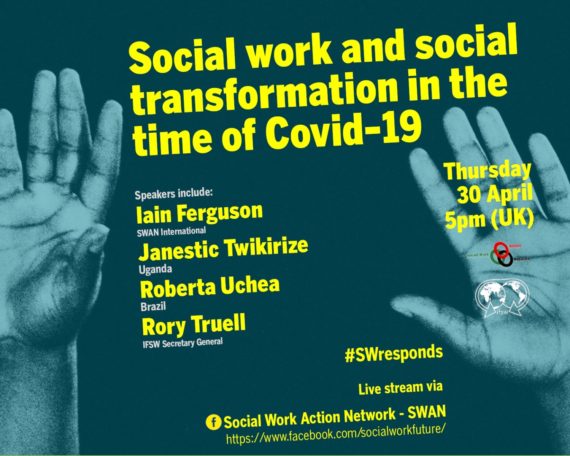Given that capitalism is a global system, it’s perhaps not surprising that the many of the problems that social workers face in Britain – managerialism, the erosion of relationship-based work, excessive workloads and so on – are also shared by workers in other countries. The fact that the SWAN Social Work Manifesto, for example, was translated into several other languages including Greek, Japanese, Mandarin and Spanish following its publication in 2005 was an early indication that the analysis and the conclusions of the Manifesto resonated with groups of workers in these countries.
 Continuing proof of that international interest in the ideas and activities of SWAN came in the form of an official invitation to organise three symposia at the International Association of Schools of Social Work’s (IASSW) biennial conference in Hong Kong in June 2010. The themes of our symposia were Neoliberalism and Social Work, Social Work, War and Resistance and Towards a Social Work of Resistance. Each of these attracted around 70/80 people and involved speakers from a wide range of countries including South Africa, Nigeria, Belgium, the USA, Greece and the UK. In addition, as the conference was taking place only weeks after the Israeli army’s attack on the Gaza Freedom Flotilla, an additional SWAN meeting was organised to denounce their illegal actions and to demand an end to the blockade of Gaza. More than 60 people attended and listened to speakers from Israel, Lebanon and Greece, followed by an excellent discussion. On the following day, a motion calling for an end to the blockade was also passed (by 94 votes to 1) at the IASSW AGM, a significant breakthrough since while the organisation has spoken out on a wide range of international issues in the past, it has been largely silent on the issue of Palestine.
Continuing proof of that international interest in the ideas and activities of SWAN came in the form of an official invitation to organise three symposia at the International Association of Schools of Social Work’s (IASSW) biennial conference in Hong Kong in June 2010. The themes of our symposia were Neoliberalism and Social Work, Social Work, War and Resistance and Towards a Social Work of Resistance. Each of these attracted around 70/80 people and involved speakers from a wide range of countries including South Africa, Nigeria, Belgium, the USA, Greece and the UK. In addition, as the conference was taking place only weeks after the Israeli army’s attack on the Gaza Freedom Flotilla, an additional SWAN meeting was organised to denounce their illegal actions and to demand an end to the blockade of Gaza. More than 60 people attended and listened to speakers from Israel, Lebanon and Greece, followed by an excellent discussion. On the following day, a motion calling for an end to the blockade was also passed (by 94 votes to 1) at the IASSW AGM, a significant breakthrough since while the organisation has spoken out on a wide range of international issues in the past, it has been largely silent on the issue of Palestine.
As well as the official conference, the visit also provided an opportunity to meet a brilliant group of radical social workers in Hong Kong with whom we had previously only had e-mail contact. The group is active in defending democratic rights in Hong Kong and in promoting a vision of social work very similar to SWAN’s. As well as hosting an informal meeting of more than twenty social workers to discuss radical/Marxist ideas of welfare, the group was also involved in organising a conference on progressive social work in which we were invited to participate (see photograph). All in all, then, a successful trip, and hopefully we will see some of the Hong Kong colleagues at our conferences in the near future.

